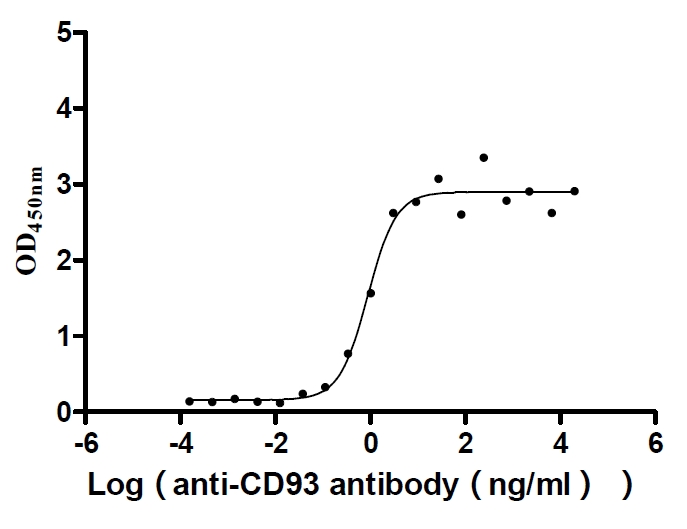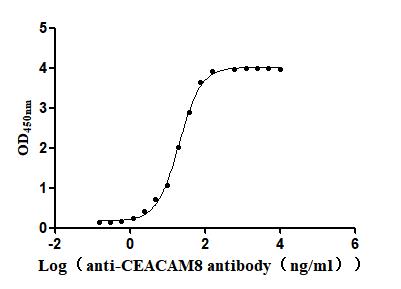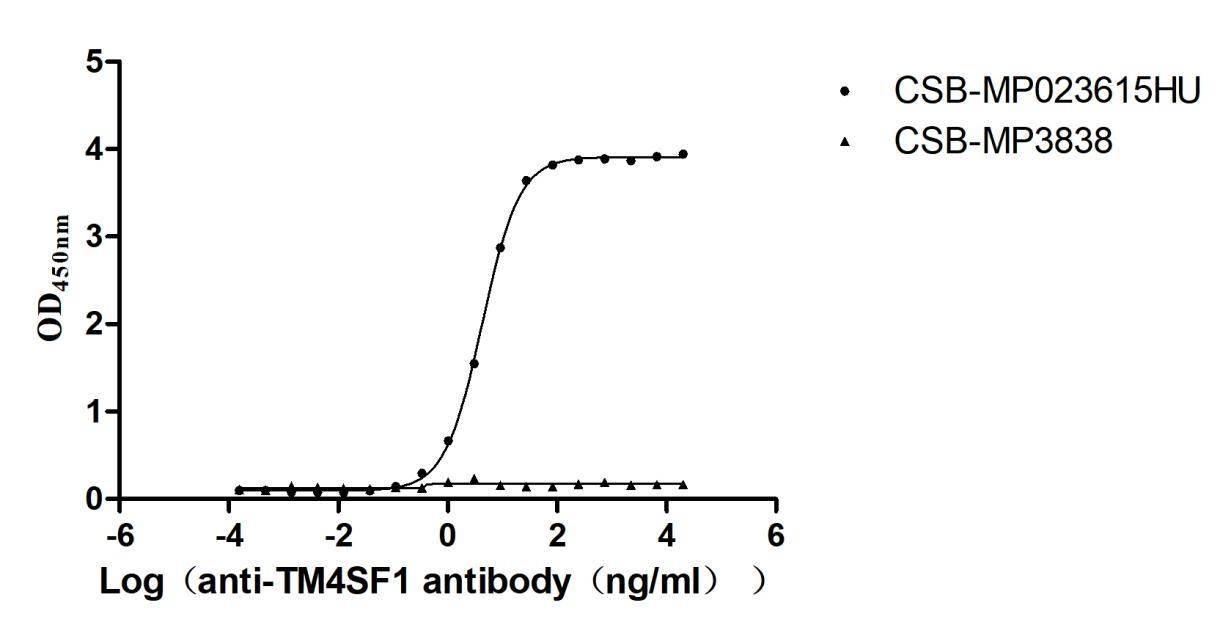Recombinant Human Glutathione S-transferase omega-2 (GSTO2)
-
中文名称:人GSTO2重组蛋白
-
货号:CSB-YP872498HU
-
规格:
-
来源:Yeast
-
其他:
-
中文名称:人GSTO2重组蛋白
-
货号:CSB-EP872498HU
-
规格:
-
来源:E.coli
-
其他:
-
中文名称:人GSTO2重组蛋白
-
货号:CSB-EP872498HU-B
-
规格:
-
来源:E.coli
-
共轭:Avi-tag Biotinylated
E. coli biotin ligase (BirA) is highly specific in covalently attaching biotin to the 15 amino acid AviTag peptide. This recombinant protein was biotinylated in vivo by AviTag-BirA technology, which method is BriA catalyzes amide linkage between the biotin and the specific lysine of the AviTag.
-
其他:
-
中文名称:人GSTO2重组蛋白
-
货号:CSB-BP872498HU
-
规格:
-
来源:Baculovirus
-
其他:
-
中文名称:人GSTO2重组蛋白
-
货号:CSB-MP872498HU
-
规格:
-
来源:Mammalian cell
-
其他:
产品详情
-
纯度:>85% (SDS-PAGE)
-
基因名:GSTO2
-
Uniprot No.:
-
别名:GSTO2; Glutathione S-transferase omega-2; GSTO-2; EC 2.5.1.18; Glutathione S-transferase omega 2-2; GSTO 2-2; Glutathione-dependent dehydroascorbate reductase; EC 1.8.5.1; Monomethylarsonic acid reductase; MMA(V) reductase; EC 1.20.4.2
-
种属:Homo sapiens (Human)
-
蛋白长度:full length protein
-
表达区域:1-243
-
氨基酸序列MSGDATRTLG KGSQPPGPVP EGLIRIYSMR FCPYSHRTRL VLKAKDIRHE VVNINLRNKP EWYYTKHPFG HIPVLETSQC QLIYESVIAC EYLDDAYPGR KLFPYDPYER ARQKMLLELF CKVPHLTKEC LVALRCGREC TNLKAALRQE FSNLEEILEY QNTTFFGGTC ISMIDYLLWP WFERLDVYGI LDCVSHTPAL RLWISAMKWD PTVCALLMDK SIFQGFLNLY FQNNPNAFDF GLC
-
蛋白标签:Tag type will be determined during the manufacturing process.
The tag type will be determined during production process. If you have specified tag type, please tell us and we will develop the specified tag preferentially. -
产品提供形式:Lyophilized powder
Note: We will preferentially ship the format that we have in stock, however, if you have any special requirement for the format, please remark your requirement when placing the order, we will prepare according to your demand. -
复溶:We recommend that this vial be briefly centrifuged prior to opening to bring the contents to the bottom. Please reconstitute protein in deionized sterile water to a concentration of 0.1-1.0 mg/mL.We recommend to add 5-50% of glycerol (final concentration) and aliquot for long-term storage at -20℃/-80℃. Our default final concentration of glycerol is 50%. Customers could use it as reference.
-
储存条件:Store at -20°C/-80°C upon receipt, aliquoting is necessary for mutiple use. Avoid repeated freeze-thaw cycles.
-
保质期:The shelf life is related to many factors, storage state, buffer ingredients, storage temperature and the stability of the protein itself.
Generally, the shelf life of liquid form is 6 months at -20°C/-80°C. The shelf life of lyophilized form is 12 months at -20°C/-80°C. -
货期:Delivery time may differ from different purchasing way or location, please kindly consult your local distributors for specific delivery time.Note: All of our proteins are default shipped with normal blue ice packs, if you request to ship with dry ice, please communicate with us in advance and extra fees will be charged.
-
注意事项:Repeated freezing and thawing is not recommended. Store working aliquots at 4°C for up to one week.
-
Datasheet :Please contact us to get it.
相关产品
靶点详情
-
功能:Exhibits glutathione-dependent thiol transferase activity. Has high dehydroascorbate reductase activity and may contribute to the recycling of ascorbic acid. Participates in the biotransformation of inorganic arsenic and reduces monomethylarsonic acid (MMA).
-
基因功能参考文献:
- the effect of specific GSTO1 and GSTO2 gene variants, independently and in interaction with established risk factors (smoking, obesity and hypertension) on the risk for the most aggressive renal cell carcinoma (RCC) subtype, the clear cell RCC, is reported. PMID: 30224590
- Results showed that the variants of rs156697 and rs2297235 of GSTO2 provide the susceptibility toward developing arsenic-induced skin lesions in individuals exposed to high-dose inorganic arsenic in northwest China. PMID: 29323258
- GSTO2 genetic polymorphisms are not associated with the development of graft-versus-host disease after allogeneic hematopoietic stem cell transplantation. PMID: 26103006
- The GSTO2 rs2297235 "AG" genotype is associated to SCA2 but failed to show any association with clinical markers, with the exception of a potential association with the age at disease onset. PMID: 28017238
- GSTO2 genetic polymorphisms are associated with the progression of HBV infection. PMID: 27221910
- No significant association has been found between childhood Pre-B acute lymphoblastic leukemia and GSTO1 A140D and GSTO2 N142D polymorphisms. PMID: 25726706
- GSTO2 and GSTP1 gene polymorphisms may serve as independent prognostic markers for hepatocellular carcinoma patients. PMID: 25892883
- Our results indicate that GSTO1*C/GSTO2*G haplotype is associated with increased risk of TCC. The modifying effect of GSTO2*G/G genotype on individual susceptibility to TCC is more pronounced, when associated with smoking. PMID: 25716313
- we for the first time provided evidence supporting the prognostic role of GSTO2 in the progression of TACE-treated hepatocellular carcinoma PMID: 25835968
- The GSTA1*-69T and GSTO2*D142 variants are both associated with a significantly increased risk of asthma. PMID: 24471578
- The results indicate that mutant GSTO2*Asp genotype is associated with increased risk of age-related cataract in smokers and ultraviolet-exposed subjects, suggesting a role of inefficient ascorbate regeneration in cataract development. PMID: 23927022
- GSTT1 active genotype and GSTO1 Asp140Asp and GSTO2 Asp142Asp genotypes may have a prognostic/pharmacogenomic role in patients with muscle invasive bladder cancer. PMID: 24040330
- No significant association between GSTO2 polymorphism and acute renal graft rejection. PMID: 23649768
- Variants in human GSTO2 could increase disease risk susceptibility and could act as a risk factor for hypothyroidism in Italian patients. PMID: 23079717
- The frequencies of GSTO1 and GSTO2 genotypes were not significantly different between head and neck squamous cell carcinoma cases and controls. PMID: 23086268
- The polymorphisms of GSTM1 and GSTO2 along with the work place influence may act additively for developing cataract. PMID: 22876127
- GSTA1 and the GSTO2 are asthma susceptible genes involved in increasing the risk of asthma development in the Italian population PMID: 22040239
- Found that rs156697 minor allele of GSTO2 associates with increased risk in the older ADs with age-at-diagnosis > 80 years. The minor alleles of GSTO1 rs4925 and GSTO2 rs156697 associate with lower brain levels of GSTO2, but not GSTO1. PMID: 22494505
- crystal structures of human GSTO2-2, stabilized through site-directed mutagenesis and determined at 1.9 A resolution in the presence and absence of glutathione PMID: 22522127
- CYP2D6 (rs16947) and GSTO2 (rs156697) polymorphisms are independent factors influencing complete remission rates of the first induction chemotherapy in de novo AML patients. PMID: 21518482
- GSTO2 NN genotype increase the risk of colorectal cancer in persons with positive family history for cancer in the first degree relatives. PMID: 21113667
- Has a role in the risk of Urothelial carcinogenesis PMID: 21094982
- Subjects who had the GSTO2 homozygous D142 genotype were found to have an increased risk of asthma PMID: 20374258
- This study provides the allele frequencies of GSTO polymorphism in a sample consisting of 116 apparently healthy individuals of both sexes from Rome (Central Italy). PMID: 20113212
- 142Asp allozyme could modulate arsenic biotransformation and thereby arsenic toxicity PMID: 20045512
- the frequencies of GSTA1 (glutathione S-transferase alpha 1), GSTM1(GST mu 1 ), GSTO2(GST omega 2) and GSTT1(GST theta 1) genotypes found in asthmatic patients differ from those of controls PMID: 20367187
- it is unlikely that glutathione S-transferases GSTA2, GSTM2, GSTO1, GSTO2, and GSTZ1 participate in breast cancer susceptibility. PMID: 19859803
- Genetic polymorphisms in GSTM1, GSTO2, XRCC1 at codons 194 and 399 may act additively for developing breast cancer PMID: 19731014
- The Asn142Asp polymorphism in GSTO2 and the GSTO1-140Asp/GSTO2-142Asp haplotype were associated with increased risk of COPD. GSTO2 is a candidate gene for COPD, but is not associated with FEV(1). PMID: 19513904
- The genetic polymorphism of GSTT1, GSTM1 and GSTO2 N412D in three Iranian populations was detected. PMID: 19430957
- polymorphisms in GSTO1 or GSTO2 do not appear to contribute to the large individual variability in arsenic metabolism or susceptibility to arsenicosis. PMID: 19635583
- Our results do not confirm an association between PD and frequency of the polymorphisms investigated: hGSTO1*A140D, & hGSTO1*E155del. PMID: 15159516
- no association either with age-at-onset in AD cases or with disease risk in the case-control cohort but haplotype analysis revealed a modest association of one haplotype with AD risk (p = 0.04) PMID: 15917099
- molecular cloning; GSTO2 was ubiquitously expressed at a low level, with a higher expression in pancreas and prostate PMID: 15942673
- a glutathione S-transferase omega 2 gene polymorphism may havea role in ovarian cancer PMID: 16761626
- Differences in expression at the protein level of the major splice variant of GSTO2 suggests that this enzyme is less active in human cells compared with chimpanzee cells. PMID: 17978102
- GSTO2 DD genotype was associated with decreased risk as compared to GSTO2 NN genotype (OR = 0.21, 95% CI: 0.05-0.92, P = 0.038) PMID: 18398695
- These results suggest a possible effect of the GSTO1 and 2 locus on age of onset of FALS. PMID: 18427999
- GSTO1*A140D polymorphism is significantly associated with susceptibility to childhood acute lymphoblastic leukemia. PMID: 18941778
- Report GSTO2 gene polymorphisms in worldwide populations. PMID: 18986335
- Our findings suggest that a significantly joint effect of cigarette smoking, alcohol consumption, arsenic and occupational exposures and risk genotypes/diplotypes of CYP2E1, GSTO1 and GSTO2 on risk of urothelial carcinoma was found. PMID: 19686770
显示更多
收起更多
-
蛋白家族:GST superfamily, Omega family
-
组织特异性:Expressed in a range of tissues, including the liver, kidney, skeletal muscle and prostate. Strongest expression in the testis.
-
数据库链接:
HGNC: 23064
OMIM: 612314
KEGG: hsa:119391
STRING: 9606.ENSP00000345023
UniGene: Hs.107384
Most popular with customers
-
Recombinant Human Tumor necrosis factor receptor superfamily member 1A (TNFRSF1A), partial (Active)
Express system: Mammalian cell
Species: Homo sapiens (Human)
-
Recombinant Human Receptor tyrosine-protein kinase erbB-2 (ERBB2), partial (Active)
Express system: Mammalian cell
Species: Homo sapiens (Human)
-
Recombinant Human Poliovirus receptor (PVR) (I340M), partial (Active)
Express system: Mammalian cell
Species: Homo sapiens (Human)
-
Recombinant Macaca fascicularis CD44 antigen (CD44), partial (Active)
Express system: Mammalian cell
Species: Macaca fascicularis (Crab-eating macaque) (Cynomolgus monkey)
-
Recombinant Human Microtubule-associated protein tau (MAPT) (Active)
Express system: Mammalian cell
Species: Homo sapiens (Human)
-
Recombinant Human Complement component C1q receptor (CD93), partial (Active)
Express system: Mammalian cell
Species: Homo sapiens (Human)
-
Recombinant Human Carcinoembryonic antigen-related cell adhesion molecule 8(CEACAM8) (Active)
Express system: Mammalian cell
Species: Homo sapiens (Human)
-
Recombinant Human Transmembrane 4 L6 family member 1(TM4SF1)-VLPs (Active)
Express system: Mammalian cell
Species: Homo sapiens (Human)


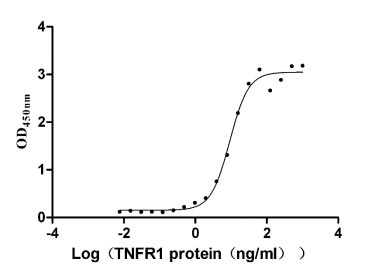
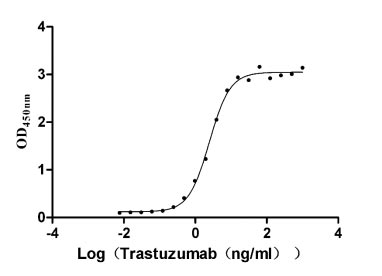
-AC1.jpg)
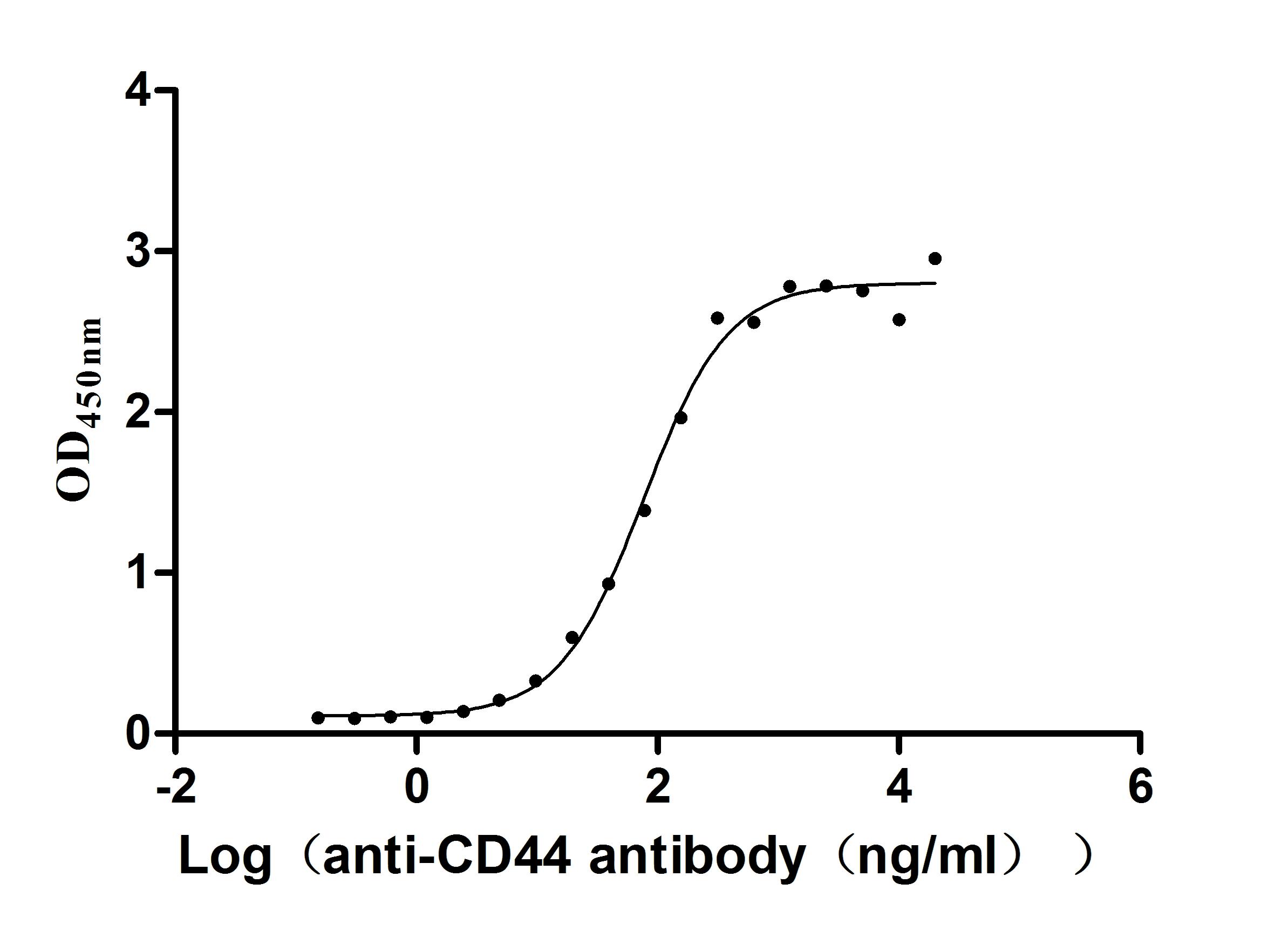
-AC1.jpg)
